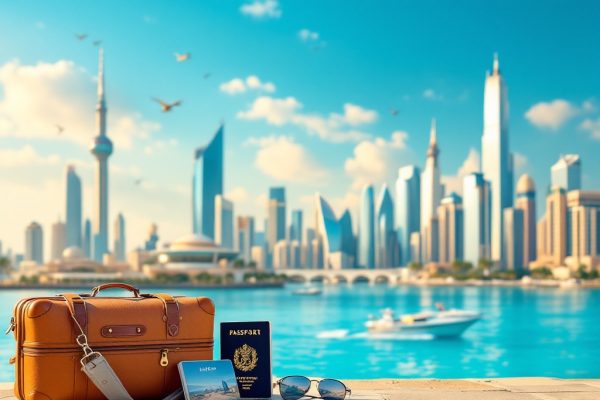Is China Safe for Travelers? Guide for Tourists
Planning an exciting trip to China? Discover essential safety tips for a smooth journey. From navigating bustling markets to understanding local laws, this guide covers everything you need. Learn about current travel advisories, health precautions, and practical advice for staying safe. Explore China with confidence and embark on your adventure prepared!
Important information

- China is generally safe for tourists, but petty theft like pickpocketing can occur in crowded areas. Be vigilant.
- Check your government’s travel advisories before and during your trip, as local laws and restrictions can change quickly.
- Respect local customs. Carry your ID, avoid public displays of affection, and be mindful of photography restrictions.
- Internet censorship is common. Many websites are blocked. While VPNs can bypass these blocks, their use is legally gray.
- Purchase travel insurance that covers medical emergencies, evacuations, and lost luggage. Medical care quality varies.
Understanding China’s Travel Safety
Traveling to China offers a generally safe experience, with low rates of violent crime and numerous positive tourist reviews. However, maintaining vigilance is crucial. Pickpockets are active in crowded areas, and local laws can be enforced unpredictably. Authorities may impose curfews or travel restrictions with little notice. Checking government travel advisories before your trip and staying informed about local customs and regulations will minimize potential issues.
Current Travel Advisory and Safety Levels
Staying informed is crucial for safe travels to China. Before and during your trip, consult your government’s travel website for the latest advisories. Also, monitor local news for real-time safety and security updates. China travel advisories are dynamic and can change due to local and global events.
Local Laws and Cultural Regulations
Traveling to China? Here’s what you need to know for a smooth trip: be aware of local laws and customs. Chinese culture emphasizes community and peaceful behavior. Always carry your ID, as officials may ask for it. Avoid public displays of affection. Be mindful of photography restrictions in certain areas.
Public Safety and Surveillance Measures
China’s extensive network of cameras and facial recognition technology enhances public safety, generally making tourists feel secure. However, it’s still wise to remain vigilant and protect your belongings. Be aware of your surroundings, especially pickpockets in crowded areas, and keep valuables secure.
Safety Tips for Travelers in China
Safeguard your valuables and choose reliable transportation, such as official taxis. Have your destination written in Chinese to overcome potential language barriers.
Be extra cautious in crowded areas, as they can be susceptible to pickpockets. Stay vigilant about your belongings.
Ensure seamless communication and navigation by acquiring a local SIM card or portable Wi-Fi device. This will help you stay connected throughout your trip.
Familiarize yourself with local laws and customs to ensure a respectful and smooth travel experience. Understanding the local culture will enhance your trip.
Travel insurance and readily available emergency contacts are strongly recommended. Having these resources in place can provide peace of mind during your travels.
While learning basic Mandarin phrases can be beneficial, remember that English isn’t widely spoken. Knowing how to ask for directions or order food in Chinese can be invaluable.
Consult your government’s travel advisory website for visa requirements and any region-specific travel restrictions. Staying informed about these crucial aspects will contribute to a hassle-free journey.
Precautions for Safe Travel
Register with your embassy or consulate if necessary. This will help ensure a smoother trip and provide support in case of emergencies.
Keep copies of your passport and visa readily accessible. Having copies can be crucial if your original documents are lost or stolen.
Opt for safe transportation options. Research reliable taxi services or public transport and avoid walking alone at night in unfamiliar areas.
Safeguard your belongings and remain vigilant, particularly in crowded places. Be aware of your surroundings to minimize the risk of theft.
Learning basic Mandarin phrases can be invaluable in emergencies. Even a few key phrases can help you communicate essential needs or seek assistance.
Familiarize yourself with local customs and regulations. Respecting local traditions will enhance your travel experience and prevent unintentional misunderstandings.
A local SIM card or portable Wi-Fi will significantly simplify navigation and communication. Staying connected will allow you to easily access maps, translation apps, and stay in touch with friends and family.
Crime Prevention: Avoiding Petty Crime and Theft
In crowded areas like markets and tourist attractions, stay aware of your surroundings. Secure your valuables in inside pockets or anti-theft bags. Avoid displaying expensive jewelry or electronics. Never leave your belongings unattended, and utilize your hotel safe for passports and important documents. Consider using a money belt or hidden pouch for extra security. Be cautious of overly friendly strangers who may be attempting to distract you. If you feel uncomfortable in a situation, remove yourself immediately.
Safety During Nighttime and in Public Spaces
Exercise increased caution at night, particularly in dimly lit or secluded locations. While many women feel comfortable walking alone after dark in bustling cities like Shanghai and Beijing, vigilance is always recommended. Always stay aware of your surroundings.
Female Travelers: Safety and Experiences
Please provide the text you want me to refine within the <original_text> tags. I’m ready to enhance it by improving clarity, engagement, and readability using effective HTML formatting while preserving the core information.
Health and Medical Considerations
Planning a trip to China? Be mindful of potential health concerns. While the local food and water are delicious, they can sometimes cause illness. Medical care is accessible, but the quality can vary, so travel insurance is highly recommended. A good policy will cover emergencies and evacuations. Air quality, especially in certain regions, can be challenging for travelers, particularly those with respiratory conditions. If your itinerary includes mountainous areas like Tibet, be prepared for the possibility of altitude sickness. With a little planning, you can ensure a safe and healthy China adventure. Here’s what you should keep in mind:
Food and Water
Be cautious with local food and water, as they can sometimes cause illness. Consider bottled water and be selective about where you eat to minimize risks.
Travel Insurance
Medical care is available, but the quality can vary. Travel insurance is highly recommended to cover potential medical emergencies and evacuations.
Air Quality
Air quality, especially in certain regions, can be a challenge. If you have respiratory conditions, take necessary precautions and consider bringing appropriate medication.
Altitude Sickness
If you plan to visit mountainous areas like Tibet, be prepared for the possibility of altitude sickness. Consult your doctor about preventive measures and acclimatization strategies.
Health Risks and Medical Services in China
Planning a trip to China? Prioritize your health and safety by considering these precautions:
Consult your doctor. Discuss recommended vaccinations for hepatitis A and B, typhoid, rabies, and Japanese encephalitis, especially if traveling to rural areas.
Pack essentials. Include a face mask to protect against air pollution and a basic first-aid kit with necessary medications.
Practice food and water safety. Opt for bottled or boiled water and choose street food vendors carefully, prioritizing cleanliness to avoid foodborne illnesses.
Secure travel insurance. Ensure your policy includes comprehensive health coverage for unexpected medical expenses.
Research local medical facilities. Identify hospitals and clinics near your destinations in case of emergencies.
Enjoy your trip to China!
Travel Insurance and Emergency Services
Travel insurance is essential for protecting your trip against unforeseen events. It typically covers unexpected medical expenses, emergency evacuations, and lost luggage. In China, keep the following emergency numbers readily available: 110 (police), 120 (ambulance), and 119 (fire). For serious incidents, your embassy or consulate can provide immediate and vital support.
Air Pollution and Altitude Sickness
Air pollution is a concern in some Chinese cities, so be mindful of this environmental factor. Travelers visiting mountainous regions, such as Tibet, should be aware of potential altitude sickness. Ascending gradually helps your body acclimatize.
Consult your doctor about medication for altitude sickness as a precautionary measure.
Transportation Safety in China
Traffic safety is crucial in China. Pedestrians must exercise constant vigilance, especially considering the high traffic fatality rates. Always use crosswalks and obey traffic signals, as drivers may not always follow regulations.China’s public transportation system, including subways, buses, and trains, is generally safe and efficient. However, be mindful of your belongings in crowded areas to prevent theft. Choose reputable taxi companies or use ride-hailing apps. Ensure taxis use a meter or pre-negotiate the fare. When using ride-hailing services, verify the driver’s identity matches the app’s information.
Staying Safe on the Roads
- Traffic safety is paramount, exercise constant vigilance.
- Utilize crosswalks and obey traffic signals.
- Be aware that drivers may not always adhere to regulations.
Using Public Transport
- Public transport is generally safe and efficient, safeguard belongings in crowded areas.
- Opt for reputable taxi companies or ride-hailing apps.
- Ensure taxis use a meter or pre-negotiate the fare, verify driver’s identity with ride-hailing apps.
Road Safety and Traffic Rules
Navigating China’s roads presents unique challenges. Driving conditions and local habits can change dramatically from region to region. Pedestrians and cyclists should exercise particular caution, especially in crowded urban areas. Familiarize yourself with traffic signals, pedestrian crossings, and right-of-way customs. Newcomers might consider alternatives like ride-sharing apps or hiring a driver for a safer and more relaxing journey.
Tips for Navigating China’s Roads
- Driving conditions and local habits vary significantly across regions.
- Pedestrians and cyclists should be extra cautious, particularly in busy urban areas.
- Understand local traffic signals, pedestrian crossings, and right-of-way rules.
Alternatives for Newcomers
- Consider using ride-sharing apps for convenient travel.
- Hiring a driver can offer a safer and more relaxing experience.
Public Transportation and Taxi Safety
Getting around China is easy thanks to its safe and efficient public transportation system, including subways and buses. However, be mindful of your belongings, especially in crowded areas. Taxis offer a convenient alternative, particularly when using reputable companies. Having your destination written in Chinese can be helpful to avoid confusion. Ride-sharing apps are also an option, but make sure to verify their legitimacy and check user reviews before using them. For popular tourist spots, consider pre-booking your transportation to save time.
Public transport
China’s public transport, like subways and buses, is a safe and efficient way to travel. Be mindful of your belongings in crowded areas.
Taxis
Taxis, especially from reputable companies, are a convenient option. Having your destination written in Chinese can help avoid confusion.
Ride-sharing apps
Ride-sharing apps are available, but verify their legitimacy and check reviews before use.
Popular tourist destinations
Pre-booking transportation is a time-saving strategy for popular tourist destinations.
Cyber and Internet Safety
Internet censorship is widespread in China, where the government restricts access to numerous foreign websites, including popular social media platforms like Facebook, Twitter, and YouTube. While a VPN can bypass these restrictions, its use remains legally ambiguous, so proceed with caution.
Protecting Your Data in China
Cybersecurity threats are a global concern, and China is no different. Safeguard your devices and data by using strong, unique passwords for every account. Exercise caution on public Wi-Fi. Avoid suspicious links and downloads from unknown sources.
- Use strong, unique passwords for every account,
- Exercise caution on public Wi-Fi,
- Avoid suspicious links and downloads from unknown sources.
Additional Security Measures
Regular software updates, along with antivirus and anti-malware programs, provide additional security. Consider using a firewall for enhanced protection. Regularly back up your data to a secure location.
- Regular software updates,
- Antivirus and anti-malware programs,
- Firewall,
- Regularly back up your data to a secure location.
Internet Censorship and Cyber Security
China restricts access to websites like Facebook, Twitter, and YouTube. To bypass these restrictions, travelers often use VPNs. Be aware that VPN use isn’t officially sanctioned and some may be blocked. Consider these local alternatives: WeChat for communication and Baidu Maps for navigation. When online, prioritize your security. Use strong passwords, avoid unsecured Wi-Fi networks, and watch out for phishing scams. These precautions will significantly improve your online safety.
Restricted Websites
- facebook,
- twitter,
- youtube,
Local Alternatives
- wechat for communication,
- baidu maps for navigation.
Bypassing Restrictions
Travelers often use VPNs to bypass restrictions, but their use isn’t officially sanctioned and some may be blocked.
Online Security Tips
- use strong passwords,
- avoid unsecured wi-fi networks,
- watch out for phishing scams.
Protection Against Cyber Threats
Create robust passwords and enable two-factor authentication to enhance the security of your accounts.
Install reputable antivirus and anti-malware software to protect your devices from online threats. Keep all software, including your operating system, updated with the latest security patches.
Avoid using public Wi-Fi networks for sensitive transactions like online banking. If you must use public Wi-Fi, use a VPN for added security.
Be cautious of phishing scams. Avoid clicking on suspicious links or opening emails from unknown senders.
Always double-check website addresses before entering any personal information.
Potential Risks and Emergency Protocols
Natural Disaster Preparedness
Preparing for natural disasters like earthquakes, typhoons, and floods is crucial for your safety. Register with your embassy and stay updated on local news. Follow evacuation orders promptly. Seek strong shelter and prepare an emergency kit with water, food, and first-aid supplies.
- Register with your embassy.
- Monitor local news for updates.
- Follow evacuation orders immediately.
- Find a strong shelter.
- Prepare an emergency kit.
Safety During Political and Social Unrest
Political and social unrest can be dangerous. Avoid large gatherings and demonstrations. Stay informed about the local situation through news and official instructions. Maintain a low profile and refrain from expressing strong political opinions for your safety.
- Avoid large gatherings and demonstrations.
- Stay informed about the local situation.
- Follow official instructions.
- Maintain a low profile.
- Refrain from expressing strong political opinions.
Responding to Natural Disasters
Staying safe during a natural disaster in China requires following these crucial steps:
Follow official instructions carefully. Heed guidance from local authorities and disaster management agencies.
Seek sturdy shelter if advised. If authorities recommend evacuation or sheltering, find a strong building quickly.
Stay informed. Monitor official news channels and local authorities for updates and instructions.
Contact your embassy or consulate. Inform them of your whereabouts and safety, as they can provide essential support.
Prepare an emergency kit. Pack essentials like water, non-perishable food, a flashlight, and a first-aid kit.
Political Activities and Safety Concerns
Traveling to China requires awareness of its political climate and social norms. Freedoms of speech and assembly are restricted, so visitors should be mindful of local laws and customs. While generally safe for travel, researching potential unrest or natural disasters at your destination is recommended. Consulting travel advisories before your trip can help ensure a safe and informed experience. Avoid any protests or demonstrations that may occur.







